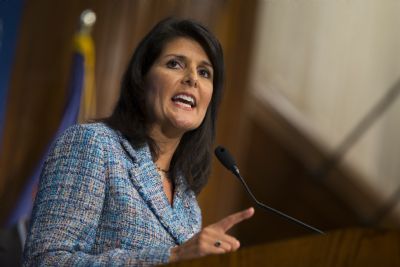"On Thursday, Mr. Guterres nominated a former Palestinian Authority prime minister, Salam Fayyad, to be the United Nations' envoy in Libya. He asked for Security Council approval. On Friday, America's new permanent representative at the UN, Ambassador Nikki Haley, unceremoniously declined to approve...
Naming 'Palestine' as Mr. Fayyad's state of origin is crucial. Never before had a person from a country that is not a full United Nations member been named to such high post. American law forbids, moreover, funding any international organization that recognizes 'Palestine' as its full member...
American officials, as well as their Israeli counterparts, sensed that Mr. Guterres' move was yet another step in the Palestinian Authority's strategy of gaining world recognition through creeping UN acceptance...
Yet the UN nomination was not about Mr. Fayyad, but about the claim to statehood that his nomination represents. Mr. Dujarric, the spokesman, argued in a statement Saturday that Mr. Fayyad's nomination was 'solely based on Mr. Fayyad's recognized personal qualities and his competence.' UN officials, he contended, 'do not represent any government or country.'
Yet, the UN is obviously aware that country of origin counts for much more than that statement let on. Mr. Dujarric's statement itself noted that 'no Israeli and no Palestinian have served in a post of high responsibility at the United Nations. This is a situation that the Secretary-General feels should be corrected.'
Yet there are those here who wonder about the logic of correcting Turtle Bay's long-held bias against assigning top jobs to citizens of Israel, a member of the United Nations since 1949, by naming to a top post an individual from a non-member state.
Trying to explain it by conflating these two as if they were one entity smacks of annulment of the UN's opposition to a 'one state solution.' Doing all this without first getting the nod from America, or any other key government, is what is amateurish."
February 11, 2017
Why the U.S. Vetoed UN Post for Former Palestinian Prime Minister

U.S. Ambassador to the UN Nikki Haley (File photo)
Date
February 11, 2017
Title
UN Erupts in an Uproar After Trump Vetoes High Post For Ex-Premier of ‘Palestine’, The New York Sun
Author(s)
Benny Avni
